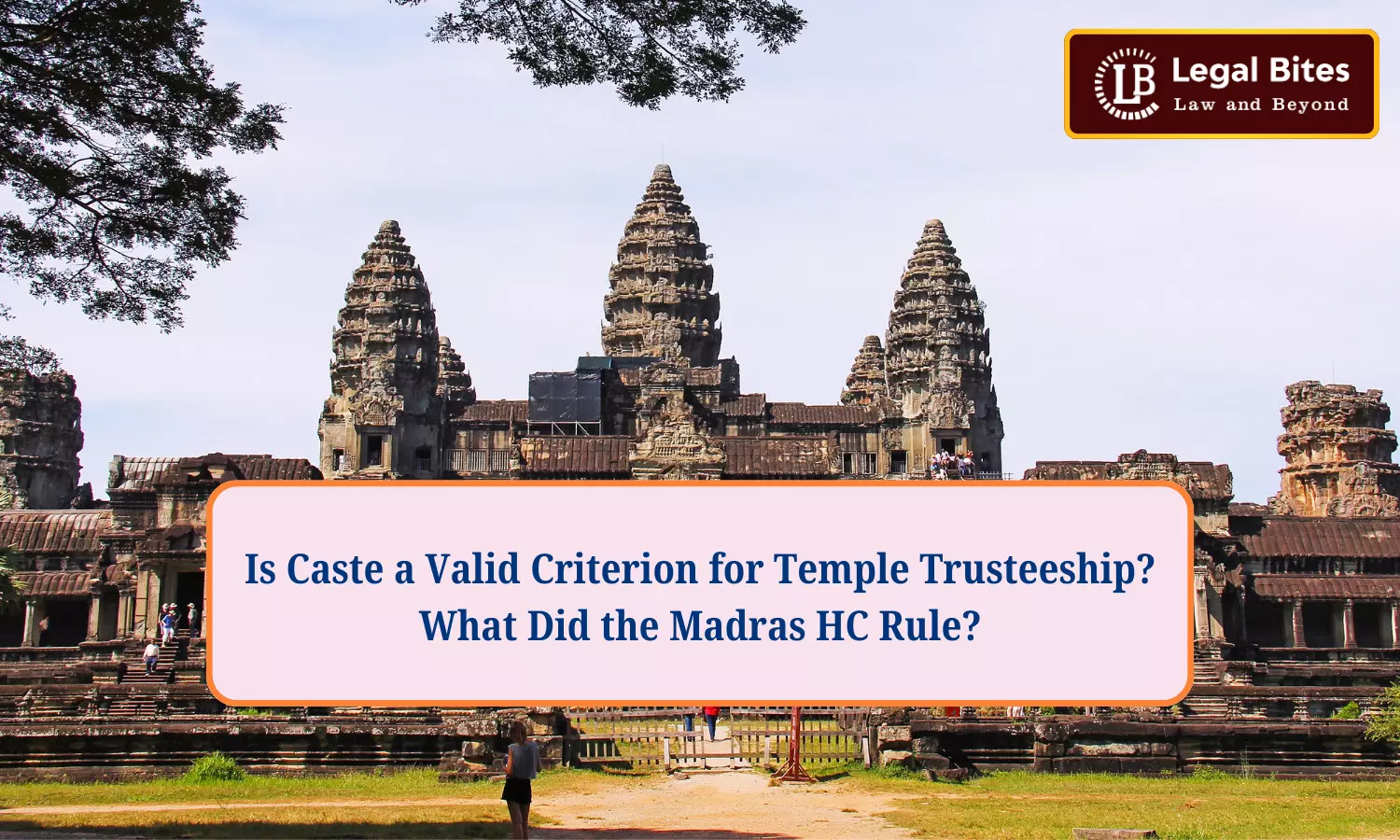Is Caste a Valid Criterion for Temple Trusteeship? What Did the Madras HC Rule?
The soul knows no caste or gender. Should temple trusteeship be bound by caste? Explore how law and faith intersect. Scroll down to read more!!

In a progressive and constitutionally significant verdict, the Madras High Court in K.V. Venugopal v. State of Tamil Nadu & Ors. [W.P. No. 15257 of 2025] categorically dismissed a caste-based claim for temple trusteeship. Delivered by Justice D. Bharatha Chakravarthy, the ruling struck down an attempt to restrict temple administration solely to members of a particular caste, holding such a claim as unconstitutional and contrary to the spirit of equality and secular governance.
The case raised vital questions about the intersection of caste, religious administration, and constitutional rights in India. With its roots in a colonial-era scheme, the dispute illuminated how caste-based controls continue to influence religious institutions even today.
Factual Background
The petitioner, K.V. Venugopal, Secretary of the Karani Gramam Sengundar Sangam, filed a writ petition challenging a notification dated 03.04.2025 issued by the Joint Commissioner of the Hindu Religious and Charitable Endowment (HR & CE) Department. The notification invited applications for the appointment of non-hereditary trustees to Arulmigu Karneeswarar Temple in Saidapet, Chennai, from the general public.
Venugopal contended that, according to a scheme decree passed in 1924 (in O.S. No. 43 of 1919), only members of the Sengunthar community residing permanently in Saidapet were entitled to be elected as trustees. He alleged that the impugned notification violated this scheme and sought to quash it, directing the authorities to conduct an election restricted to the said caste.
Issues Raised
- Whether caste-based exclusivity in temple trusteeship can be justified under any valid legal or constitutional framework.
- Whether a scheme decree of 1924, established during colonial rule, survives post-independence constitutional scrutiny.
- Whether the HR & CE Department is competent to alter or disregard caste-centric schemes in favour of inclusive governance.
Petitioner’s Contentions
- The scheme decree of 1924 mandated that trustees of Arulmigu Karneeswarar Temple be elected only by Sengunthar community members.
- Previous notifications had complied with this provision and restricted applications accordingly.
- The present notification, by allowing applications from the general public, diluted community rights and religious customs.
Respondent’s Submissions
- The scheme had been modified over time, and there was no surviving legal basis for caste-based exclusivity.
- The HR & CE Department had the authority to issue inclusive notifications for better administration and transparency.
- Caste-based restrictions in public religious institutions are against the constitutional mandates of equality and secularism.
Relevant Legal Provisions
Article 14: Equality before the law.
Article 15(1): Prohibits discrimination on grounds of religion, race, caste, sex, or place of birth.
Article 26: Freedom to manage religious affairs, subject to public order, morality, and health.
The Court’s Reasoning
Justice D. Bharatha Chakravarthy began the judgment by invoking visionary figures such as Swami Vivekananda, Bharathidasan, and Dr. B.R. Ambedkar, emphasising the philosophical and constitutional drive towards a casteless society. The judgment held that caste, being a birth-based classification, cannot dictate religious administration in a constitutional democracy.
"Caste is a social evil. Casteless society is our constitutional goal. Anything towards perpetuation of caste can never be considered by any Court of law."
Key Judicial Observations
1. Caste is Not a Religious Denomination:
The Court reaffirmed that caste does not qualify as a "religious denomination" under Article 26 of the Constitution. Hence, it cannot claim exclusive rights over temple administration.
2. Constitutional Supremacy:
The Constitution of India, especially Articles 14, 15, and 16, prohibits discrimination on the grounds of caste. Any scheme, custom, or administrative action violating this principle is liable to be struck down.
3. Supreme Court Precedent:
Referring to Ashoka Kumar Thakur v. Union of India [(2008) 6 SCC 1], the Court highlighted the Supreme Court’s position that the ultimate goal of the Constitution is a casteless and classless society.
“The ultimate aim is a casteless society… Caste-based discrimination remains. Where casteism is present, the goal of achieving a casteless society must never be forgotten.”
4. Public Policy and Constitutional Morality:
The Court noted that perpetuating caste-based administration in temples is not only unconstitutional but also against public policy. The judiciary, as a constitutional guardian, must prevent such retrogressive practices.
5. Religious Equality and Human Dignity:
The judgment underscored that all individuals are equal before God, and religion must not be used as a tool for caste-based exclusion.
"Before God, all persons are human beings and therefore, there cannot be any discrimination based on caste."
Impact of the Judgment
This ruling has far-reaching implications for the governance of temples and religious institutions across India. It:
- Ends caste monopolies in temple administration where no denominational rights are demonstrable.
- Reinforces State power to reform and democratise religious institutions through the HR & CE Department.
- Aligns administrative practices with constitutional principles of secularism, equality, and social justice.
- Sets precedent for future cases where caste-based claims challenge inclusion in religious governance.
Broader Constitutional Vision
The judgment aligns closely with the vision of Dr. B.R. Ambedkar and other framers of the Indian Constitution, who foresaw fraternity as essential for sustaining liberty and equality.
"In India there are castes. The castes are anti-national. They bring about separation in social life… we must overcome all these difficulties if we wish to become a nation in reality."
Conclusion
The Madras High Court's ruling in K.V. Venugopal v. State of Tamil Nadu is a bold and necessary affirmation of constitutional morality over regressive customs. It reiterates that public religious institutions must remain inclusive and secular in their governance. While respecting the right to manage religious affairs, the judgment ensures that such rights do not become a vehicle for perpetuating casteism.
In rejecting caste-based trusteeship, the Court paves the way for democratised temple administration and reaffirms that equality, not birth, is the cornerstone of governance in India’s constitutional order.

